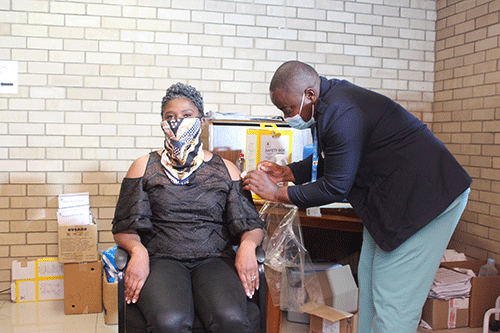The African Continental Free Trade Area came into being on 1 January 2021, with the entire continent hoping it would usher in a new era of rapid growth and development for the continent’s largely limping economies.
But AfCFTA came in the middle of the Covid-19 pandemic, which saw unprecedented closing of borders, restriction of movement of people and goods – and a massive public health crisis in countries that were already struggling with ailing health care systems.
Africa now battles low vaccine takeup that further hamstrings the recovery.
Chief economist at the Sanlam Group Arthur Kamp said vaccine hesitancy is a concern that cannot be fixed immediately, and blamed the lack of information – something that will affect AfCFTA if not adequately addressed.
Kamp said this at the Sanlam Summer School in Johannesburg, South Africa, while addressing African journalists
during a training session on financial journalism, with a focus on AfCFTA.
“Vaccine hesitancy is a concern. It is not something that can be fixed immediately. There is a need for the increased level of vaccination in communities because the non-vaccinated will play a role in the progress of the area,” said Kamp.
The AfCFTA agreement is forecast to create the largest free trade area in the world measured by the number of countries participating.
The pact connects 1.3 billion people across 55 countries with a combined gross domestic product worth about US$3.4 trillion.
It aims to boost intra-African trade by providing a comprehensive and mutually beneficial trade agreement among the member states, covering trade in goods and services, investment, intellectual property rights and competition policy.
Lockdowns enforced by most African countries in the light of Covid-19 generated a socio-economic crisis within the region at a time when AfCFTA is in its critical
phase of implementation.
Secretary general of AfCFTA Wamkele Mene during an interview with African Africa Renewals, a UN information programme that provides analysis of the major economic and development challenges facing the continent, said they are exploring other ways of continuing technical work with the existence of the pandemic.
“Trade negotiations are very technical. We negotiate in four languages (English, French, Arabic and Portuguese). We must make provisions for the different time zones in Africa. And there are requirements for confidentiality. All these have to be considered before we can continue the negotiations if at all we can continue the negotiations on virtual platforms,” he assured.
Mene added: “We would like to resume our work as soon as the pandemic is contained. But if for whatever reason the pandemic continues, which we hope it will not, we are exploring other ways of advancing our negotiations”.
“Economic nationalism over vaccines and other products and services as the Covid-19 pandemic came to a head. Against this backdrop, AfCFTA has arrived. Furthermore, tourism is the main changer in economic development, and that means the movement of people is tantamount to this,” stated Lesley Wentworth, the director of Tutwa Consulting Group, which conducts authoritative research into and analysis of complex policy and regulatory matters affecting business in emerging markets.
She added that increasing awareness about AfCFTA is key and in the same vein, more thought should be given to sustainable infrastructure to ease and facilitate the movement of people between regions.
The World Health Organisation (WHO) mentioned that just five African countries, less than 10% of Africa’s 54 nations, are projected to hit the year-end target of fully vaccinating 40% of their people unless efforts to accelerate the pace take off.
In its October release, WHO added around 50 million Covid-19 vaccine doses have arrived in Africa, which is almost double what was shipped in September.
At the current pace, Africa still faces a 275 million shortfall of vaccines against the year-end target of fully vaccinating 40% of its people. Africa has fully vaccinated 77 million people – just 6% of its population.
In comparison, over 70% of high-income countries have already vaccinated more than 40% of their people.
With the persistent vaccine hesitancy most African nations, like Namibia, have fully vaccinated only 217 700 citizens (by 13 November), which is 8.7% of the 2.5 million population.
Namibia needs to vaccinate at least 65% of its entire population by March 2022 to reach herd immunity.
The WHO recommended Namibia vaccinates 10 000 people per day to reach that number. However, Namibia’s vaccination figure has in recent weeks declined, along with positivity rate and deaths, to less than 1 900 per day and just above 10 000 vaccines administered per week.
The country administers Johnson & Johnson, AstraZeneca, Sinopharm and Pfizer. - psiririka@nepc.com.na


